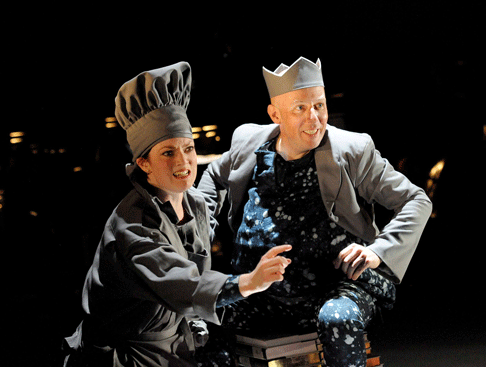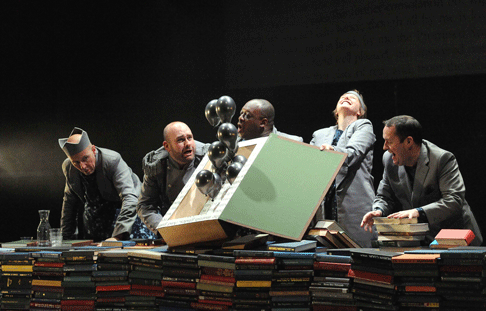Bedford is one of the most promising British composers, some of whose work
has almost become basic repertoire, by new music standards. He’s the first
composer-in-residence at the Wigmore Hall. For more background, please read the
interview he gave recently to Opera
Today.
Seven Angels is loosely based on John Milton’s Paradise
Lost, but it’s not a literal, or even literary account. It’s not even
a typical opera where singing leads music. Instead, the drama unfolds from the
music, almost more like an extended tone poem, with voices. This is a work by a
composer who is primarily a musician, although he has a special affinity for
writing for voice.
Seven Angels is allegory, and like allegory, it works obliquely.
Seven angels descend to earth and find it barren. What has happened to the
Garden of Eden? The angels don’t know, so they use their intuition to imagine
backwards how things might have come to pass. It’s not narrative in the usual
sense, as the characters are building the story as they go along. They don’t
know the answers but work towards them by listening and using their instincts,
as should we. This is more than just a tale about of environmental ruin.
The noisiest section in the work was inspired by a real conference where
politicians debated what to do with starving nations, while they themselves
feasted and made empty promises. Because the vocal writing here is so dramatic,
it’s easy to mistake this posturing for the message of the opera. The angels are imagining themselves as conference delegates and shout worthy slogans. But the
point is that the politicians’ words are hollow.
Like the expressive markings on a score, words are an aid to interpretation
but they aren’t the music itself. Because the staging, by John Fulljames and
The Opera Group, was devised as the music itself developed, the production
gives fairly strong clues as to what this opera is really about. The stage is
covered in books — hundreds of books, millions of words. The background is a
filmed projection of printed pages. Sometimes the words are legible, sometimes
not — quantity rather than quality. The subjects are irrelevant. This is a
deluge of unprocessed data, a cacophony of text without meaning.
Significantly, the angels don’t read books to find out the history of the
planet. They follow their instincts and act out in role-play. Two angels become
King and Queen! If there were two, they made a third. So another angel becomes
The Prince. He’s voracious, obsessively tearing pages from books and stuffing
them into his mouth, until his belly grows so large it seems he’ll burst.
He’s consuming, but consuming what? Is it content that he’s consuming, or
paper and pages, irrespective of sustenance?
Only when the books start to run out does the Prince see himself, reflected
in the metal at the bottom of his plate. Later, the angels act out a Conference
where authority figures opine piously about environmental waste, in stylized
declamation. The table they’re sitting at is made of books, piled high. Then
the books begin to topple, like the Tower of Babel. Yet again, the point is
that words alone fail to communicate.
 Rhona McKail as the Waitress and Christopher Lemmings as the Prince
Rhona McKail as the Waitress and Christopher Lemmings as the Prince
Bedford’s Seven Angels as a musical evolution whose secrets are
encoded in the orchestration, both vocal and instrumental. It should be studied
in concert performance to focus on the musical logic, for this writing is
subtle and inventive. The opera starts with a mysteriously opaque murmur that
gradually takes shape. Just as the Bible describes Seven Days of Creation, the
music moves in plateaux, ideas developing in groups, then moving onwards to new
planes. Great contrasts. As the angels get into their imaginative stride, the
pace quickens with brightly agitated ostinato, moments of wit and
exuberance, before the angels gradually come to realize the tragedy that has
happened.
The orchestration is quite singular. Low-pitched winds and trumpet, four
violas, contrabass and bassoon/contrabassoon, piano and a panoply of percussion
and sound effects. Darkness, mystery, ambiguity. What is that mournful wailing
towards the end? It is the song of the contrabassoon, bizarre but surprisingly
beautiful. Percussion and sound effects like the analogue radio create
atmospheric complexity. In this context, even the familiar sound of a violin
seems shocking, when we’ve been lulled by the four viola chorus.
There is a strong integration between vocal and non-vocal forces. The violas
rumble, a singer snores. The angels stand in line, snapping the pages of books,
so the sound becomes another form of percussion. It’s remarkably effective,
and might be an element of staging that survives into future productions. When
the angels return to the heavens, there’s a wild whirring sound as if time
itself were being reversed. Extraordinarily vivid.
 (Left to Right) Christopher Lemmings as the Prince, Owen Gilhooly as the General, Keel Watson as the King, Emma Selway as the Queen, Joseph Shovelton as the Industrialist
(Left to Right) Christopher Lemmings as the Prince, Owen Gilhooly as the General, Keel Watson as the King, Emma Selway as the Queen, Joseph Shovelton as the Industrialist
This libretto, by Glyn Maxwell, “sings” even on the page, for text that
is sung is music, not mere shapes on a page. Bedford translates it extremely
sensitively. Each angel is distinctive, and lines can be heard clearly when
needed, retreating into the whole as instruments do, when a more diffuse effect
is needed. No heroic feats of gymnastic singing needed. These angels are
feeling their way into human situations. The lines are semi-conversational,
with occasional flights of wild fantasy (the queen in particular — a telling
psychological touch). This gives expressive freedom and must make it a pleasure
to sing. I can imagine whatSeven Angels might be like with truly top
rank singers, but these communicate well. It’s almost an anachronism to refer
to these singers as “cast” because they function like the musicians of the
Birmingham Contemporary Music Ensemble do, individuals as part of a whole unit.
Nicholas Collon conducts.
For an opera where musical values mean so much, the staging is integral to
the production. I specially loved the images of the cosmos, white specks of
light flickering in darkness, replicated in filmed projections and in the
costumes the singers wear. Grey jackets, like the ash on the barren desert they
visit. Books are lined up in rainbow colours: an image of the Paradise that’s
been lost. Luke Bedford’s Seven Angels is how opera should be done,
libretto and staging growing with the music from an early stage. It’s an
extremely rewarding experience, much more emotionally satisfying than a lot of
recent new opera. It’s not, however, quick-fix like musical fast food, to be
consumed mindlessly. The finest meals are the ones that nourish, not the ones
that come in fancy plastic packaging.
Anne Ozorio
image=http://www.operatoday.com/Seven_Angels114_1.gif
image_description=Christopher Lemmings as the Prince [Photo by Alastair Muir courtesy of The Royal Opera]
product=yes
product_title=Luke Bedford: Seven Angels (Libretto: Glyn Maxwell)
product_by=Angel 1/Waitress: Rhona McKail; Angel 2/The Queen: Emma Selway; Angel 3/The Chef/Preistess: Louise Mott; Angel 4/ The Prince: Christopher Lemmings; Angel 5/The Porter/Industrialist: Joseph Shovelton; Angel 6/The Gardener/General: Owen Gilhooly; Angel 7/The King: Keel Watson. Birmingham Contemporary Music Group. Nicholas Collon. Director: John Fulljames. Designer: Tadasu Takamine. Lighting: Jon Clark. Projection: Ian William Galloway. Linbury Studio Theatre, Royal Opera House, London, 12th July 2011.
product_id=Above: Christopher Lemmings as the Prince
All photos by Alastair Muir courtesy of The Royal Opera